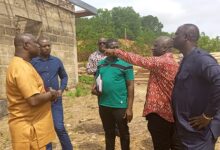As humans, we need toilet facilities to defaecate into and so such facilities are commonplace in homes and public buildings, particularly in high-income countries.
However, as already hinted in the preceding sentence, low/middle-income countries lack the widespread of such facilities.
For instance, in Ghana, only 59.3 per cent households have their own toilets, 23 per cent of them use public toilets and 17.7 per cent have no access to a toilet facility, which means that they do open defaecation with all its health and other hazards.
Seeing the challenges with sanitation and clean water as a threat to human survival in some countries, the United Nations (UN) in 2015 dedicated to water and sanitation the sixth of 17 Sustainable Development Goals (SDGs) it had adopted to address global challenges and achieve a better and more sustainable future for all by 2030.
The SDG 6, captioned ‘Clean Water and Sanitation’, aims to ensure the availability and sustainable management of water and sanitation for all and since its adoption, the global body has been assisting and urging on affected countries to ensure 100-per cent access to toilet facilities, for example.
It is instructive to note that according to UNICEF’s Joint Monitoring Programme (JMP) Report, in 2015, only 15 per cent of the Ghanaian population had access to better sanitation facilities and that with the inception of the SDGs in 2015, the government has been making every effort to meet all its Sanitation and Water targets by 2030.
One instance of such efforts is the support the government gives through the district assemblies to help households without toilets construct some.
To scale up the efforts of the government, all in a bid to meet the 2030 deadline, the Ministry of Sanitation and Water Resources intends to engage about two million students of vocational and technical universities in the country in the construction and installation of bio-digester toilets for households.
Thus, the Ministry has partnered with the Faculty of Built and Natural Environment of the Kumasi Technical University (KsTU) to train the students.
We commend the government for its efforts in the water and sanitation sector, particularly with regard to the provision of household toilet facilities, which obviously are meant to eradicate open defaecation.
However, we wish to remind the government that open defaecation will persist unless it provides free or affordable public toilets, at least, for people who live on the street in the country’s cities.
Streetism is growing in the country and the government must factor this phenomenon in its planning concerning water and sanitation.
The phenomenon has become unavoidable for some people like kayayei because they have had to leave the harsh economic conditions of their rural settlements to seek greener pastures in the cities but have no abodes and need some.
Prior to the 2016 General Election, then-candidate Nana Addo Dankwa Akufo-Addo promised to build hostel facilities for the ‘kayayei’ to afford them decent accommodation.
Presenting the 2020 budget statement in Parliament in 2019, the Finance Minister, Ken Ofori-Atta, said the construction of the hostel would begin in December 2019 at Agbogbloshie, a suburb of Accra.
If this is done, it will help reduce sanitation challenges created by streetism.




